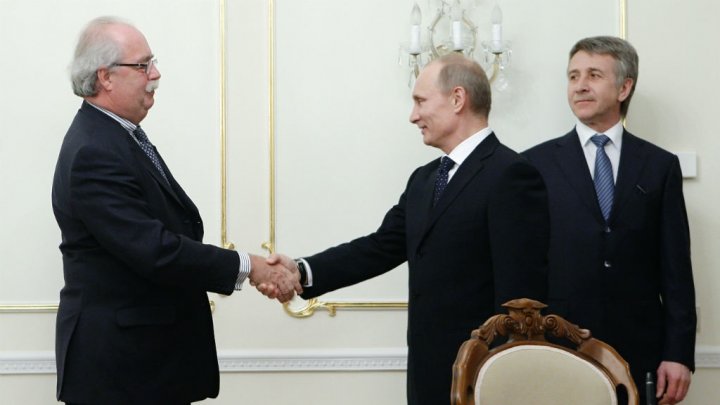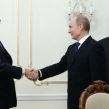
Siege Mentality Dominates in Moscow
Publication: Eurasia Daily Monitor Volume: 11 Issue: 188
By:

Christophe de Margerie, 63, the CEO of French oil major Total, was killed as his executive jet crashed during takeoff on the runway of Moscow’s Vnukovo airport, at about midnight, on October 20. The jet hit an airport snowplow vehicle, flipped over and burst into flames, killing all on board: de Margerie and a crew of three. The snowplow driver, Vladimir Martinenko, 60, was uninjured and has been arrested. The Russian Investigative Committee (SKR) has accused the snowplow driver of being drunk and is threatening further arrests. The SKR spokesman Vladimir Markin announced: “It is obvious this incident is not simply a tragic coincidence, but the result of the criminal negligence of top officials” (Kommersant, October 22). On October 23, the SKR announced the arrest of four more Vnukovo airport air traffic controllers and top employees (RIA Novosti, October 23).
In an official telegram to French President Francois Hollande, President Vladimir Putin expressed his deep condolences, called de Margerie a “true friend of Russia” and announced he was “shocked” by his death (kremlin.ru, October 21). De Margerie had been a staunch opponent of imposing sanctions to punish Russia for its annexation of Crimea and involvement in fighting in the Donbas region of eastern Ukraine. De Margerie has been close to Putin’s inner circle, including oil and gas tycoon Gennady Timchenko, who is under US sanctions. De Margerie’s jet crashed when he was returning to Paris after attending a meeting of the Russian government’s Consultative Council on foreign investment, together with some 30 other top foreign business executives at Russian Prime Minister Dmitry Medvedev’s country residence of Gorki near Moscow. TV channel Rossiya-1 distributed the text of de Margerie’s speech at the Gorki meeting that was closed to the press:
I speak as the CEO of Total and the co-chairman [together with Timchenko] of the Russo-French business council. We are ready to continue to invest in Russia and bring in the best of our know-how. We are against sanctions; we believe they are unjust and counterproductive. Political problems must be resolved by political means. Russia has many friends and partners in the West; Russia cannot be isolated economically or politically (Vesti, October 21).
De Margerie insisted Total is complying with EU sanctions, but is lobbying the French government to restore stable and peaceful economic relations with Russia (Vesti, October 21).
According to reporting in Moscow, de Margerie lobbied the government in Paris to deliver to the Russian navy the first French-built Mistral-class helicopter-carrying assault ship, despite the European Union’s sanctions and the Ukrainian crisis (Snob, October 21). The pro-Kremlin tabloid press in Moscow reports: A friend of Russia and an enemy of the US died in a plane crash. De Margerie is quoted to have called for the euro to be used instead of the dollar in international oil transactions (Komsomolskaya Pravda, October 21).
For Russia’s rulers, de Margerie seemed the embodiment of an ideal European partner—or something more: A French aristocrat and major oil CEO, anti-American in inclination, his partnership helped give Putin a virtually free hand to squash internal dissent or deal with neighboring former Soviet republics like Ukraine. An influential figure in French business and political decision-making, de Margerie was ready to invest together with Kremlin insiders and transfer know-how in exchange for access to Russia’s natural riches. With the help of unscrupulous collaborators within the European ruling classes (a.k.a. “true friends of Russia”), the Kremlin hopes to turn the present Ukraine-induced crisis into a major strategic victory by undermining the Transatlantic link between Europe and the United States, eroding EU sanctions and gaining de facto recognition of Moscow’s sphere of special interests in the Russian “near abroad,” which was, until 25 years ago, under Soviet dominion. Timchenko declared de Margerie an icon of chivalry. His sudden tragic death is seen as a severe, devastating blow. According to Kommersant, de Margerie was an increasingly lone figure on the board of Total still pressing for closer cooperation with Russia despite sanctions, the Ukrainian crisis and the new cold war (Kommersant, October 23).
Pro-Kremlin tabloid Komsomolskaya Pravda quotes oil expert Sergei Pravosudov: The Russian oil industry, hit by sanctions, badly needs cooperation with French Total to get access to Western know-how. This cooperation depended on de Margerie and his influence in Paris. With de Margerie gone, Total may cave under US pressure and disinvest from projects in Russia (Komsomolskaya Pravda, October 22).
In today’s Russia, swept by xenophobic paranoia actively incited by the state TV propaganda machine, dark conspiracy theories are always close at hand. The ultranationalist Liberal-Democratic Party (LDPR) fraction in the Duma insists: The death of de Margerie is not a coincidence, but a deliberate act (“a diversion”) by Russia’s enemies (rusnovosti.ru, October 22). According to a recent poll by independent pollster Levada Tsentr, a siege mentality dominates society: 84 percent believe Russia is surrounded by enemies, while only 8 percent agree with the opposite. This siege mentality is at an all-time high: 82 percent describe relations with the US as negative, while last January only 17 percent expressed the same opinion. Some 66 percent describe relations with the EU as “negative,” compared with 10 percent last January. Some 79 percent believe the negative reaction by the West (the US and the EU) to Moscow’s actions in Ukraine is caused by a desire to “suppress Russia and undermine its world influence” (rbcdaily, October 21).
Surrounded by external enemies and their presumed internal agents, Russia is rallying around Putin, according to first deputy chief of the presidential administration, Vyacheslav Volodin. Speaking to Russian and foreign political scientists in Sochi at an annual meeting of the Valdai Club, Volodin announced Western sanctions have consolidated Russians in support of Putin, who has an approval rating of some 84 percent. Russians love Putin and are grateful for the stability and prosperity he has bestowed on them. “While there is Putin, there is Russia; without Putin, there will be no Russia,” declared Volodin (Izvestia, October 22).
Putin and all other Russian top officials use Vnukovo airport for air travel in and out of Moscow, using a separate government terminal—Vnukovo-2. De Margerie used the business-travel Vnukovo-3 terminal, but the two crossing runways of Vnukovo, now described as badly lit and uneven, are used by all commercial, private and official state jets, including Putin’s. The control tower, run by the air traffic controllers who were arrested by the SKR, and the runway-cleaning service serve all Vnukovo air traffic. The SKR may have begun a major witch-hunt to seek out possible conspirators that have hit de Margerie and could be threatening Putin. The future of Russia seems frighteningly fragile, if Volodin is taken at face value.




